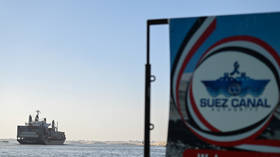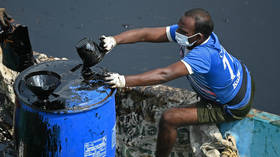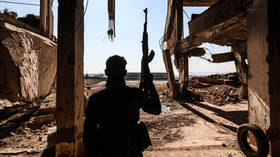Oil diplomacy: How Russia shields India’s Red Sea shipments

As the Israel-Gaza war enters its 13th week, its disastrous repercussions are being felt across the capitals of the world. Most noticeably, the death of thousands of Palestinian civilians as a result of the Israeli invasion of Gaza has led to outrage in the pan-Arab world. Unexpected methods of resistance are cropping up – attacks on US military bases, massive protests in European and American cities, the breakdown of Arab-Israeli ties, and Houthi attacks on Israel.
In a major spill over of the crisis, the Yemen-based Houthi rebels have started attacking maritime cargo headed for Israel and passing through the Strait of Hormuz. In November last year, the insurgents had boarded and seized an Israel-bound cargo ship named Galaxy Leader. The British-owned, Japanese-operated vessel was subsequently diverted to the Yemeni port of Hodeidah, where the boat and its crew are being held hostage. Since this attack, more than 40 vessels have been targeted by Houthis, mainly in the Red Sea.
Previously confined to the Middle East, the three-month-old Gaza conflict is now affecting economic links and the maritime supply chain globally. The Bab-el-Mandeb Strait handles as much as 30% of global container traffic and is one of the naval chokepoints of the world, the other two being the Strait of Malacca and the Panama Canal.
World’s oil artery
The tactics used by the Houthi rebels are not new. In what is now famously known as the Tanker War during the Iran-Iraq war of the 1980s, both states targeted tankers of each other and their allies passing through the Strait of Hormuz. The current Houthi rebels are widely believed to be funded by the Iranian government, and the current tactics are intended to pressure the Western governments to stop the ongoing conflict.
Given that the Strait is a vital chokepoint of the world’s maritime trade, including at least 1/5th of the world’s oil consumption, it has aptly been referred to as “the world’s most important oil artery.” Any disruption in commercial traffic passing through this region has a direct impact on global oil and commodity prices. For instance, Brent Crude, the international benchmark for oil, has risen by 8% since the start of the Red Sea crisis. During the Tanker War of the 1980s, the price of Brent crude crossed $40 per barrel, equivalent to $140 per barrel today. Major shipping companies have instructed vessels to sail around southern Africa instead, a longer and, therefore, more expensive route.
The United States has stepped up its patrolling and surveillance of the region, a place where it had deployed ships following the October 7 attacks. Britain and Bahrain have also dispatched vessels to the area, but uncertainty among shipping firms still lingers. Evergreen Line has announced the suspension of further shipping through the Red Sea “until further notice.”
New Delhi’s concerns
Frequent attacks have also driven up insurance fees and freight rates by shipping firms, who are now levying war risk surcharges on top of routine freight passage rates. This could potentially lead to pricier rates for Indian cargo headed for Europe and Africa. Experts estimate that cargo rates may hike up to 25-30% due to the Houthi attacks.
The Mangalore-bound MV Chem Pluto had come under fire from the Houthis while traveling through the Red Sea. It sent distress calls to the US warships in the region, who then responded. On December 24, two more Indian-operated shipping vessels, MV Saibaba and Blaamanen, were the targets of Houthi-launched drone attacks. Following the incidents, the Indian Navy and the Coast Guard scrambled vessels to the region to ensure safe passage of maritime traffic. At least five Indian guided missile destroyers, including the INS Visakhapatnam, are patrolling the area to boost security.
However, Indian oil deliveries passing through the Red Sea have remained unaffected. The secret to this Indian immunity has been Moscow’s involvement. Since the start of the Ukraine conflict, almost 40% of India’s total oil imports have originated from Russia. Iran, which backs the Houthi rebels, has been a steadfast partner and ally of Moscow, and the Iranian-Russian partnership has grown closer with the exports of military hardware, especially its signature Shaheed drones, which have boosted the Russian military arsenal.
An unexpected result of this growing bonhomie is that the Houthis have refrained from targeting commercial shipping vessels originating from Russia. However, despite this silver lining, India’s cargo originating or headed to other places, such as Western Europe, may not be as secure. Western European states, along with the United States, are widely seen in the Arab world as Israeli sympathizers and, consequently, passive participants in the ongoing war in Gaza.
The way ahead
Such open attacks by the Houthis to achieve their goals are similar to the all-out warfare declared by Germany during the First World War. In an attempt to suppress the British wartime economy, the Germans had declared that all shipping, even from neutral countries, headed towards Britain would be valid targets.
The tactic is infamously known for causing the entry of the United States into the conflict, ultimately leading to a German defeat. Similarly, it is likely that such indiscriminate targeting of commercial ships passing through the Strait of Hormuz might instead have the reverse effect of alienating other countries from the Palestinian cause.
India, for its part, must utilize its diplomatic leverage with Iran to ensure safe and secure passage for Indian shipments. Indo-Iranian relations have generally been warm, and given that India has been one of Tehran’s few steady allies, India’s requests for immunity from Houthi attacks will be seriously considered. All in all, the attacks have again shown the vulnerability of the global commercial chokepoints to disrupt trade movements and induce market volatility.
The rise of multiple state and non-state actors in the emerging multipolar world also means that more actors would be able to influence economic trade flows. The current Tanker wars are a testament to it. In such a world, balanced actors with multi-aligned foreign policies, such as India, become critical for bridging global differences while ensuring their security and independence.
Where India Meets Russia – We are now on WhatsApp! Follow and share RT India in English and in Hindi















